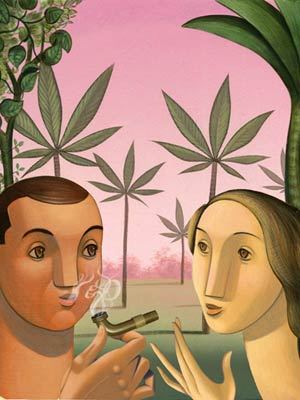
An entheogen, according to the Oxford Dictionary is a chemical substance, typically of plant origin, that is ingested to produce a non ordinary state of consciousness for religious or spiritual purposes.
Cannabis is more than simply a drug or a plant. It is one of the most historically prevalent entheogens, and its influence throughout history is quite impressive.
From India to the Caribbean, many have used cannabis not only to alter consciousness, but to experience something greater. Unraveling its illustrious past may open a window into the beyond.
India
India is an apt place to begin this world tour. Here, the Hindu religion and dharma — or way of life — mentions the use of cannabis within its many teachings and practices.
The Vedas, sacred texts of Hinduism, hail cannabis as a hallowed plant, “which releases us from anxiety.” Furthermore, there are many references to cannabis as a “joy giver” and a “source of happiness” throughout the Vedas as well. Additionally, there are stories of gods sending hemp to the people so that they may lose fear, embrace joy, and attain enlightenment within Hinduism.
In fact, during some festivals and weddings, in honor of Shiva — a god who brings hemp to the people — many consume and celebrate cannabis. It is also sometimes brought to shrines and temples as offerings.
Additionally, Yogis and Sadhus, Hindu holy men and practitioners, smoke a mixture of tobacco and cannabis during meditations and special ceremonies in order to enhance their experiences during meditation.
China
In China, according to The Brazilian Journal of Psychiatry, historian Joseph Needham noted that “the hallucinogenic properties of hemp were common knowledge in Chinese medical and Taoist circles for two millennia or more.”
Ancient Chinese Shamans, who often served as doctors, were fully aware of cannabis’ effects and even prescribed it, according to research published in the Journal of Psychedelic Drugs.
Several preserved texts exist today of these very same general prescriptions for Chinese mafen, or cannabis fruit/flower, presented in the Biodiversity Heritage Library:
“To take much makes people see demons and throw themselves about like maniacs. But if one takes it over a long period of time one can communicate with the spirits, and one’s body becomes light [of weight].”
These ancient doctors even prescribe cannabis to cleanse the mind and soul. One shaman, for instance, prescribed cannabis to “those who see demons.”
Central Asia
Historians have also found evidence of the entheogenic cannabis use in Central Asia (a region directly north of the Middle East). Here reside the nomadic Scythian peoples of this region.
The Scythians were innovators far before their time, as ancient historian Herodotus found during his time in Central Asia. Instead of a normal steam bath or sauna that Herodotus was accustomed to in his normal Greek life, the Sythians had a slightly different tradition. He writes:
“The Scythians take some hemp-seed and throw it upon the red-hot stones; immediately it smokes and gives out such a vapour as no Grecian vapour-bath can exceed; the Scyths delighted, shout for joy, and this vapour serves them instead of a water-bath.”
Essentially, these Scythians hot-boxed in a makeshift booth. Herodotus additionally noted that cannabis and this tradition was so popular that their use spread to the neighboring Thecian peoples. The Thecians then started a cult called the Kapnobatai, which means “those who walk in the clouds.”
Even despite such first-hand accounts of cannabis use, there is much archaeological evidence of cannabis as an entheogenic as well.
According to National Geographic, archaeologists uncovered tombs containing cannabis in the region.
Some of these tombs contained the whole cannabis plant while others contained just traces of the flowers, pollen, and leaves. In all cases, however, cannabis was placed in and around the tomb. That implies it was important not only during life but especially during death, according to the Journal of Ethnopharmacology.
Caribbean
Moving farther west to the land of wood and water,are the famous and iconic Rastafari. When colonialism and trade came across the water from India, along with many other traditions, so too came Cannabis. As the popularity of the plant grew, the culture grew as well.
Rastafarianism is a relatively new religion with a straightforward emphasis on smoking cannabis. Although cannabis consumption is not necessary in Rastafarianism, its followers believe that cannabis is a holy plant. As such, many Rastafarians smoke ganja as part of rituals called “reasoning sessions.”
U.S.
Finally, there is the U.S. and its comparatively very recent brush with the entheogenic tones of cannabis.
In more modern times, members of the hippie movement in the 1960s embraced cannabis for its spiritualistic potential.
Many hippies saw the use of cannabis as not only a symbolic stand against the powers that be, but also as a spiritual key and an ethereal answer. As hippie Cliff Middleton wrote on his blog:
“The herb carries a spirit, a spirit of unfaltering righteousness that opened our minds to the hope and glory of peace and love. It was a moral and spiritual rearmament the likes of which we had never seen before.”
Takeaways
Throughout history and in various places around the world, cannabis goes beyond the ordinary and enters the metaphysical.
Altered states are inexplicably tied to human history, divinity, and spirituality. And so cannabis is tied to the same mast as well. Being high may truly be an insight into something greater for our minds to experience. Or it may simply be a chemical reaction in the brain. But either way, it is undeniably a reflection of our soul.



Leave a Reply